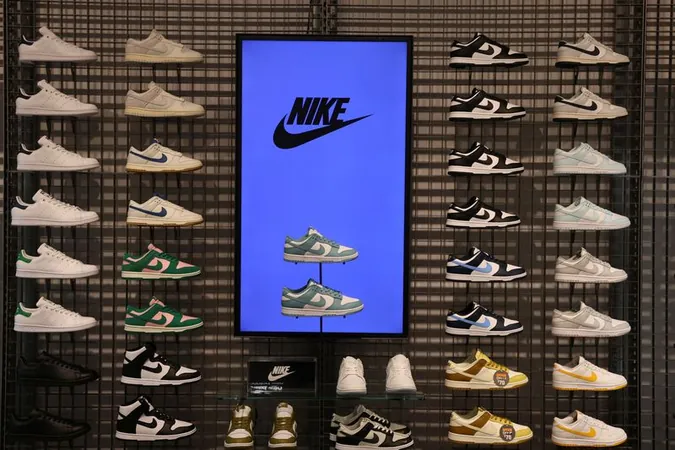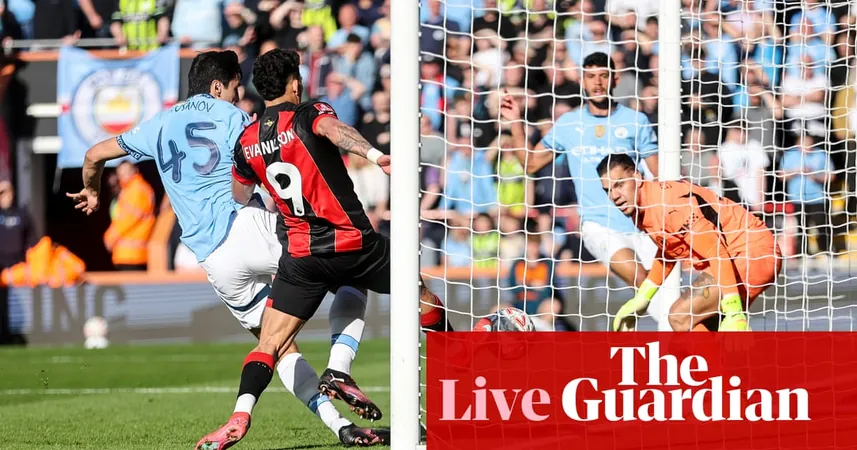
Nike's Shocking Fourth-Quarter Forecast Causes Share Plunge!
2025-03-20
Author: Ting
Nike, the global leader in athletic footwear and apparel, has issued a concerning forecast for its fourth-quarter revenue, indicating a significant decline that has rattled investors. Following a third-quarter earnings call held on Thursday, shares of Nike dropped sharply in after-hours trading, highlighting growing anxiety over the company's ability to regain consumer loyalty amid fierce competition from trendier brands.
During the earnings call, Chief Financial Officer Matthew Friend revealed that Nike expects a revenue decline in the mid-teens percentage range for the fourth quarter—a sharper decrease than the 12.22% expected by analysts, who anticipated revenues to fall to $11.07 billion. This forecast comes on the heels of third-quarter results that initially seemed promising, reporting strong consumer engagement with new footwear models such as the Pegasus Pro and Vomero 18.
Despite a rise in shares right after the earnings announcement, Nike's stock reversed course, plummeting nearly 5% from a close of $71.86. The success of the new sneaker line, which expedited development under the leadership of newly appointed CEO Elliott Hill, has only offered temporary relief amid an overall climate of reduced consumer spending following various quarters marked by low demand.
Nike's third-quarter revenue was down 9% to $11.27 billion, with diluted earnings per share plunging 30% to 54 cents. While these results did surpass Wall Street expectations of an 11.5% revenue drop to $11.01 billion and an even steeper earnings decline of 62.2%, the overall outlook remains grim—particularly with China, a crucial market, experiencing a 17% drop in demand. Concerns over job stability and an ongoing property slump in the region have compounded the company's challenges.
Friend emphasized the urgency of revamping Nike’s presence in China, stating, "Sport is growing in China and we must accelerate our pace there." Analysts, including Morningstar's David Swartz, have raised alarms about the troubling performance in this vital market. Swartz remarked, "While overall results beat expectations, you can't ignore the foreboding results in China."
CEO Elliott Hill, who took charge just five months ago, has committed to a strategic overhaul aimed at restoring Nike's reputation for innovation and rekindling relationships with retailers. This shift follows previous CEO John Donahoe's pivot towards direct-to-consumer sales, which strained partnerships with retail outlets.
In a bid to rebuild its brand image, Nike has ramped up its marketing efforts, notably featuring in its first Super Bowl advertisement in 27 years, showcasing female athletes like Caitlin Clark—an acknowledgment of the rising popularity of the Women’s National Basketball Association.
Despite these efforts, Nike continues to face revenue pressure, largely attributed to hefty discounts on established lines like the Air Jordan 1, Air Force 1, and Dunk sneakers—an attempt to clear out outdated inventory in favor of innovation. The company's gross margin has shrunk by 330 basis points to 41.5%, primarily due to increased discounting and rising production costs.
As analysts and investors brace themselves for further challenges, many are optimistic about the potential for future product launches to resonate more effectively with consumers. Ramiz Chelat, a portfolio manager at Vontobel, expressed a glimmer of hope, stating that the response to new offerings could signal promising prospects for the brand moving forward.
With the sportswear industry evolving rapidly, Nike's ability to adapt and innovate will be critical as it navigates an increasingly competitive landscape. Will the brand reclaim its position as the leader in athletic gear, or will it fall further behind its rivals? Only time will tell!


 Brasil (PT)
Brasil (PT)
 Canada (EN)
Canada (EN)
 Chile (ES)
Chile (ES)
 Česko (CS)
Česko (CS)
 대한민국 (KO)
대한민국 (KO)
 España (ES)
España (ES)
 France (FR)
France (FR)
 Hong Kong (EN)
Hong Kong (EN)
 Italia (IT)
Italia (IT)
 日本 (JA)
日本 (JA)
 Magyarország (HU)
Magyarország (HU)
 Norge (NO)
Norge (NO)
 Polska (PL)
Polska (PL)
 Schweiz (DE)
Schweiz (DE)
 Singapore (EN)
Singapore (EN)
 Sverige (SV)
Sverige (SV)
 Suomi (FI)
Suomi (FI)
 Türkiye (TR)
Türkiye (TR)
 الإمارات العربية المتحدة (AR)
الإمارات العربية المتحدة (AR)